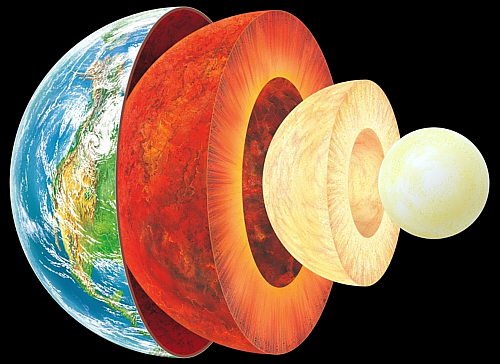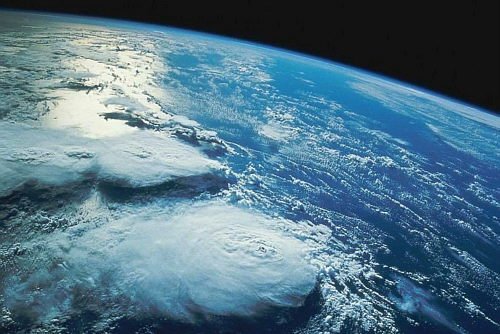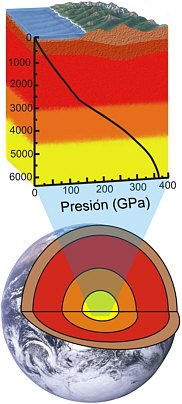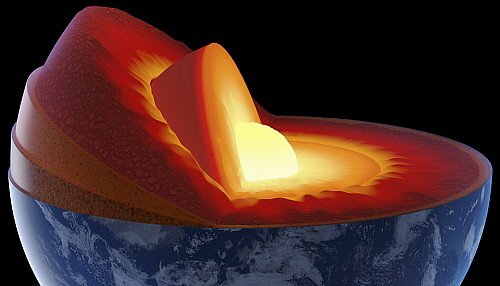Structure of the Earth and Parts
Good evening friends of Steemit tonight I was investigating a bit about the structure of the earth and I found it interesting to share with you.
Structure of the Earth
The Earth is made up of numerous layers, some external and others internal. They are divided into several groups according to their state: solid or semi-liquid, liquid or gas.
The crust of planet Earth is a thin layer formed by rigid plates that rest on the upper mantle. Together they form the lithosphere and float on the asthenosphere, a layer of hot and pasty materials that, sometimes, come out through a crack forming volcanoes.
The density and pressure increase toward the center of the Earth. In the core are the heaviest materials, the metals. The heat keeps them in a liquid state, with strong movements. The inner core is solid.

The internal forces of the Earth generate movements that are noticed on the outside. Rapid movements originate earthquakes; the slow ones form folding, like those that created the mountains.
The fast rotary movement and the metallic core generate a magnetic field that, together with the atmosphere, protects us from the harmful radiations of the Sun and the other stars of the Universe.
Layers of the Earth
From the outside to the inside we can divide the Earth into five parts:
Atmosphere: It is the gaseous covering that surrounds the solid body of the planet. It has a thickness of more than 1,100 km, although half of its mass is concentrated in the lowest 5.6 km.
Hydrosphere: It is composed mainly of oceans, but in a strict sense it includes all the aquatic surfaces of the world, such as inland seas, lakes, rivers and groundwater. The average depth of the oceans is 3,794 m, more than five times the average height of the continents.

Lithosphere: Composed mainly by the earth's crust, it extends up to 100 km deep. The rocks of the lithosphere have an average density of 2.7 times that of water and are composed almost entirely of 11 elements, which together make up 99.5% of its mass. The most abundant is oxygen, followed by silicon, aluminum, iron, calcium, sodium, potassium, magnesium, titanium, hydrogen and phosphorus. In addition, 11 other elements appear in quantities less than 0.1: carbon, manganese, sulfur, barium, chlorine, chromium, fluorine, zirconium, nickel, strontium and vanadium. The elements are present in the lithosphere almost completely in the form of compounds rather than in their free state.

The lithosphere comprises two layers, the crust and the upper mantle, which are divided into about twelve rigid tectonic plates. The upper mantle is separated from the crust by a seismic discontinuity, the discontinuity of Mohorovicic, and the lower mantle by a weak zone, the asthenosphere. The plastic and partially molten rocks of the asthenosphere, 100 km thick, allow continents to travel across the earth's surface and oceans open and close.
Mantle: It extends from the base of the bark to a depth of about 2,900 km. Except in the area known as asthenosphere, it is solid and its density, which increases with depth, ranges from 3.3 to 6. The upper mantle is composed of iron and magnesium silicates such as olivine and the lower one of a mixture of magnesium, iron and silicon oxides.
Core: It has an outer layer of about 2,225 km thick with an average relative density of 10 Kg per cubic meter. This layer is probably rigid, its outer surface has depressions and peaks. On the contrary, the inner core, whose radius is about 1,275 km, is solid. Both layers of the core are composed of iron with a small percentage of nickel and other elements. The temperatures of the inner core can reach 6,650 ° C and its average density is 13. Its pressure (measured in GigaPascal, GPa) is millions of times the pressure on the surface.

The inner core continuously radiates intense heat outwards, through the various concentric layers that form the solid portion of the planet. The source of this heat is the energy released by the decay of uranium and other radioactive elements. Convection currents within the mantle transfer most of the Earth's thermal energy to the surface.
It is possible to conclude that the study of the earth is very important since it is necessary to know its parts so that when carrying out previous studies of geological character that can be known the disposition of the extracts of each of the capable of the earth.
References
- Remington, Bruce A .; Drake, R. Paul; Ryutov, Dmitri D. (2006). "Experimental astrophysics with high power lasers and Z pinches". Reviews of Modern Physics. 78
- Benuzzi-Mounaix, A .; Koenig, M .; Husar, G .; Faral, B. (June 2002). "Absolute equation of state measurements of iron using laser driven shocks". Physics of Plasmas. 9 (6). Bibcode: 2002PhPl .... 9.2466B. doi: 10.1063 / 1.1478557.
- Cohen, Ronald; Stixrude, Lars. "Crystal at the Center of the Earth". Archived from the original on 2007-02-05. Retrieved 2007-02-05.
- Stixrude, L .; Cohen, R. E. (1995). "High-Pressure Elasticity of Iron and Anisotropy of Earth's Inner Core". Science. 267 (5206): 1972-5. Bibcode: 1995Sci ... 267.1972S. doi: 10.1126 / science.267.5206.1972. PMID 17770 BBC News, "What is at the center of the Earth? Bbc.co.uk (2011-08-31) .Retrieved on 2012-01-27.
- Ozawa, H .; al., et (2011). "Phase Transition of FeO and Stratification in Earth's Outer Core". Science. 334 (6057): 792-794. Bibcode: 2011Sci ... 334..792O. doi: 10.1126 / science.
You received a 10.0% upvote since you are not yet a member of geopolis.
To read more about us and what we do, click here.
https://steemit.com/geopolis/@geopolis/geopolis-the-community-for-global-sciences-update-3
If you do not want us to upvote and comment on your posts concerning earth and earth sciences, please reply stop to this comment and we will no longer bother you with our love ❤️
What if the inner earth is Agartha?
nice. I really like this part, enjoy our beautiful earth!
It's a shame I missed out on Earth Science in Junior High. Remembering facts about the Earth's layers and volcanic formations was a blast. It explains why we have all these active volcanoes and continental plates shifting around.
Great read, thanks mate :)
It was the structure of the earth that first made me question 'how' we knew what we knew and lead me down a path of science :)